EDRi statement: the fundamental rights consequences of the EU media ban
European Digital Rights (EDRi) is appalled by the illegal and atrocious invasion of Ukraine by Russia’s totalitarian regime. We stand with the people of Ukraine who are forced to live in fear and flee from their homes while enduring war crimes and other large-scale human rights violations, including cyberattacks. Democratic societies that respect the rule of law should stand in solidarity with the deep suffering of people in Ukraine on many levels.
Filter resources
-

EDRi statement: the fundamental rights consequences of the EU media ban
European Digital Rights (EDRi) is appalled by the illegal and atrocious invasion of Ukraine by Russia’s totalitarian regime. We stand with the people of Ukraine who are forced to live in fear and flee from their homes while enduring war crimes and other large-scale human rights violations, including cyberattacks. Democratic societies that respect the rule of law should stand in solidarity with the deep suffering of people in Ukraine on many levels.
Read more
-

France must not betray European citizens on the DSA at the 11th hour
As civil society, we welcomed Minister Cedric O’s commitment on Friday to prohibit targeted advertising to minors as well as the use of sensitive data for ad targeting in the DSA. Now the French Council Presidency must follow through and protect citizens, 35 NGOs write in an open letter.
Read more
-

The Digital Markets Act promises to free people from digital walled gardens
Last night, 24 March, the European Union made a great step forward to better protecting our rights online as it approved the political trilogue compromise for the Digital Markets Act (DMA). This decision promises to challenge the strongly centralised environment of Big Tech platforms exerting too much power over our rights and over the flow of information in society. Tech companies like Facebook, Google, Amazon and Apple will have to start following strict rules that ensure free and fair competition in the digital markets.
Read more
-

Cyberattacks on Ukraine’s infrastructure and civil society violate human rights
Alongside Russia’s eight years of armed aggression against Ukraine and its ongoing threats of large-scale invasion, cyberattacks on Ukraine’s critical infrastructure and civilian services are putting people’s human rights at risk. We call on the international community to provide the necessary support to Ukraine and its human rights defenders to ensure people are protected from cyber threats.
Read more
-
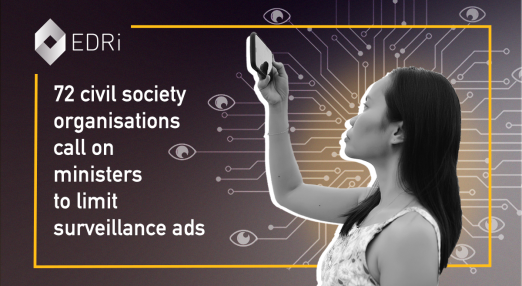
Open Letter: Abolish manipulative dark patterns and creepy online ads, ask 72 civil society organisations
Ahead of the upcoming Digital Services Act (DSA) trilogue meeting on 15 March, EDRi, Liberties and Amnesty International and 69 other civil society organisations have sent a joint open letter to 20 ministers and state secretaries in 9 EU Member States. On Tuesday 1.03.2022, several organisations in the Netherlands, Denmark, Germany, France, Spain, Italy, Luxembourg, Austria, Croatia delivered the letter to relevant decisionmakers responsible for their country's position in the EU negotiations.
Read more
-

Belgian authority finds IAB Europe’s consent pop-ups incompatible with the GDPR
Following a number of complaints filed in 2018 and 2019, including by EDRi-members Panoptykon and Bits of Freedom, and coordinated by the Irish Council for Civil Liberties, the Belgian Data Protection Authority has found that the consent system developed and managed by the adtech industry body IAB Europe, and used by many websites in the EU, is illegal under the GDPR.
Read more
-

The EU Parliament takes strong stance against surveillance ads
The Platform Power campaign, alongside many civil society organisations, raised its voice for stronger laws against the business model of Big Tech online platforms and succesfully pressured law-makers to put people at the center of the debate.
Read more
-

Framing the future of the internet
The European Parliament has just voted on the Digital Services Act, crucial for internet regulation.
Read more
-
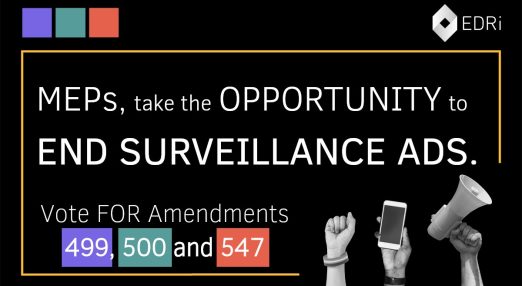
People ask MEPs: Take the opportunity, end surveillance ads!
Thousands of people are asking the EU Parliament to end online surveillance advertising , ahead of the DSA (Digital Services Act) vote in the plenary on Thursday, 20 January 2022. EDRi is part of the movement mobilising people, together with individual organisations in the PeopleVsBigTech group and beyond.
Read more
-
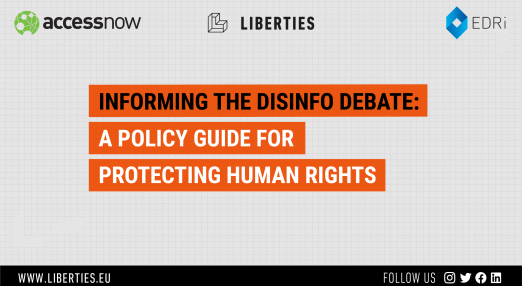
Booklet: Informing the disinfo debate
Today, 20 December 2021, EDRi, Access Now and Civil Liberties Union for Europe publish a joint report as a continuation of its 2018 predecessor, Informing the “Disinformation” Debate. The main outcome of this report is a set of policy recommendations addressed to the EU co-legislators focusing on: how to effectively mitigate fundamental rights risks that result from the manipulative methods deployed by large online platforms that exploit people’s vulnerabilities and their sensitive data; and how to combat disinformation in a manner that is fully compliant with fundamental rights standards.
Read more
-
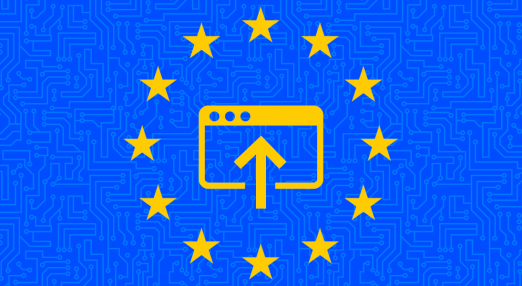
Digital Services Act: EU Parliament’s key committee rejects a filternet but concerns remain
The European Union's Digital Services Act (DSA) is a big deal. It's the most significant reform of Europe’s internet platform legislation in twenty years and the EU Commission has proposed multiple new rules to address the challenges brought by the increased use of services online. EU members of Parliament (MEPs) showed that they listened to civil society voices: Even though the key committee on internal market affairs (IMCO) did not follow the footsteps of the ambitious DSA reports from last year, MEPs took a stance for the protection of fundamental rights.
Read more
-
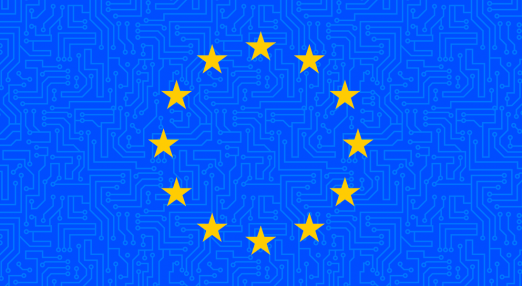
EU Parliament Takes First Step Towards a Fair and Interoperable Market
The EU’s Proposal for a Digital Market Act (DMA) is an attempt to create a fairer and more competitive market for online platforms in the EU. It sets out a standard for very large platforms, which act as gatekeepers between business users and end users. As gatekeepers “have substantial control over the access to, and are entrenched in digital markets,” the DMA sets out a list of dos and don'ts with which platforms will have to comply.
Read more
